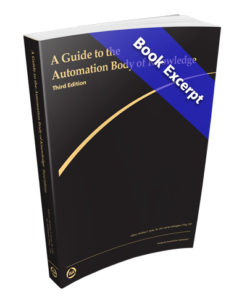AutoQuiz is edited by Joel Don, ISA's social media community manager.
This automation industry quiz question comes from the ISA Certified Automation Professional (CAP) certification program. ISA CAP certification provides a non-biased, third-party, objective assessment and confirmation of an automation professional's skills. The CAP exam is focused on direction, definition, design, development/application, deployment, documentation, and support of systems, software, and equipment used in control systems, manufacturing information systems, systems integration, and operational consulting. Click this link for more information about the CAP program.
In the maintenance sequence, the technician often knows what the needed resources are before going to fix the device or equipment, as in a known transmitter failure. The technician's challenge is to restore the device to service as quickly as possible. Which definition below, according to the maintenance sequence, defines the quantity "restore time"?
a) repair time + time to close work order
b) repair time + testing time
c) time to troubleshoot/diagnose/isolate + travel time + repair time
d) repair time and restore time are the same quantity
e) none of the above
Answer A is not correct, as work order closure is not required to restore a device to service. Cleanup, work order closure, and return to shop are activities that occur after the restore time period.
Answer B is not correct, because testing time is included in the repair-time activities.
Answer D is not correct, because restore time requires additional activities to be completed beyond the repair-time activities, as described above.
The correct answer is C, "time to troubleshoot/diagnose/isolate + travel time + repair time." The restore time includes all activities required to diagnose and repair the device. This includes diagnosing the problem, isolating the device from the system, traveling to the device, and repairing the device. Repair time includes removing/repairing/replacing the device, aligning/adjusting/calibrating the device, and testing/restarting the device.
Reference: Nicholas Sands, P.E., CAP and Ian Verhappen, P.Eng., CAP., A Guide to the Automation Body of Knowledge. To read a brief Q&A with the authors, plus download a free 116-page excerpt from the book, click this link.
About the Editor
Joel Don is the community manager for ISA and is an independent content marketing, social media and public relations consultant. Prior to his work in marketing and PR, Joel served as an editor for regional newspapers and national magazines throughout the U.S. He earned a master's degree from the Medill School at Northwestern University with a focus on science, engineering and biomedical marketing communications, and a bachelor of science degree from UC San Diego.





